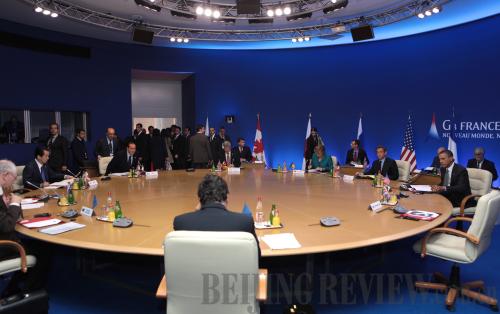|
 |
|
ROUNDTABLE DISCUSSIONS: The G8 Summit opens in the French seaside resort of Deauville on May 26 (XINHUA) |
While he stopped short of explicit endorsement, Obama did say the need for "fiscal consolidation" and "dealing with debt" were important. He himself is facing opposition Republican demands for massive cuts. But the UK remains the member of the G8 with the most radical program so far.
This gave extra force to British Prime Minister David Cameron's most noticeable intervention in which he implicitly criticized other members of the group for their failure to devote enough of their GDP for assistance to developing countries. Arguing against a meeting of "men in suits" who spoke a lot, and did little, Cameron said the UK viewed the 0.7 percent of its GDP devoted to aid work in developing countries as a wise investment, helping global growth, and preventing the rise of destabilizing, radical groups dominating politics in failing regimes.
Statistically, with the United States committing less than 0.3 percent of GDP to development budgets overseas, and France, Germany and Italy all falling well below the UK figure, Cameron had a point. This has not stopped criticism in the UK of his ring fencing the aid budget and health budgets at a time when all other areas of public expenditure are under attack.
Global issues
International events for the G8 were mostly focused on the ongoing NATO-led campaign in Libya to protect citizens against the unrest there. Expressing strong support for the recent transitions to new governments in Egypt and Tunisia, the final declaration said all members wanted to see "the common goals of developing the rule of law and citizen engagement."
The most pressing issue, however, was to secure ongoing support for UN resolutions 1970 and 1973, and for these, for the first time, Russia expressed support, despite abstaining during the vote itself in April. Condemning the use of violence to repress protests in Syria, the G8 managed to maintain a unified position. But the challenges of maintaining pressure on a deeply entrenched Colonel Muammar Gaddafi in Libya were not understated, and while Sarkozy said the main objective was simply "to see him go," there remain many questions about how long this would take, and what would be in place if and when it happened.
One of the most powerful and unexpected issues that occurred in the background was the issue of who might replace Strauss-Kahn as the IMF chief, since his resignation earlier in May. Traditionally, the leadership of the IMF has fallen to a European. They are, after all, the largest source of funds. But the increasing debate about how representative this is in a period in which the EU proportion of GDP is falling, and the systems of global governance need to become more representative, would not go away.
One reporter asked Sarkozy why it looked increasingly likely that current French Finance Minister Christine Lagarde was going to be rewarded with the job, despite powerful candidates from outside the United States and Europe. Sarkozy replied this was a decision for the board of the IMF, and that in any case, the EU had already conceded 5 percent of its voting rights to non-EU members. Even so, this issue captured the changes happening in the world, with a larger voice to actors well outside the EU, and the continuing need to reform the global architecture of decision making.
As a further sign of this, the issues of climate change, with the aspiration of reducing carbon dioxide emissions globally by 50 percent from current levels, and support for research and development, were addressed in language that showed these were collaborative aspirations, and that their successful implementation lay far beyond the G8.
Sarkozy had in particular sponsored a focus on the Internet, and the meeting was attended by the key leaders of Google, Facebook and Twitter. Sarkozy spoke of the need to encourage Internet players to "have imperatives in terms of security, intellectual property and even digital taxation." The challenging role of the Internet as a massive enabler of economic growth, and yet a highly disruptive player in terms of intellectual property rights, is likely to be a central debate in the years ahead.
One observer said this had been a "good G8." This was despite fears it would be looked upon as an increasingly irrelevant event. Perhaps most importantly, the next one will be held in the United States next year, at a critical time in Obama's presidency. Dates so far have not been set but for obvious reasons are likely to be in the months around November when the elections take place.
Perhaps the G8 this time has demonstrated to its most powerful member it has continuing relevance and that it should be maintained. In any case, it has to fit in closely with the agendas of other global gatherings.
The author is a senior research fellow with Chatham House, London
(Viewpoints in this article do not necessarily represent those of Beijing Review) | 